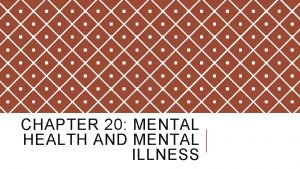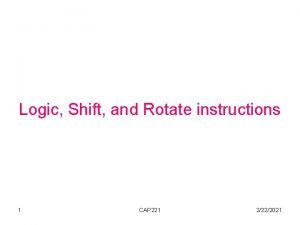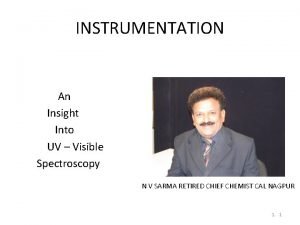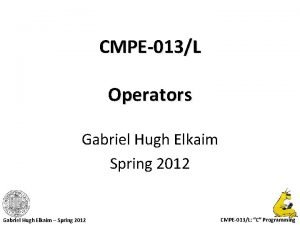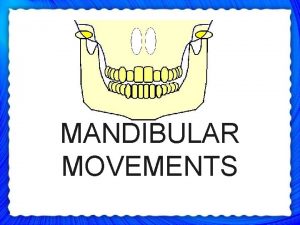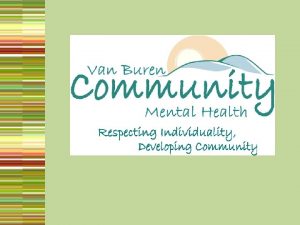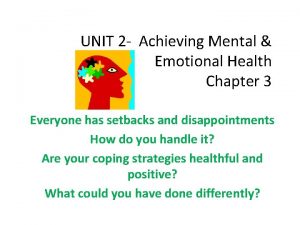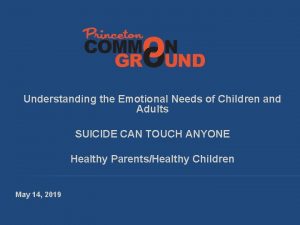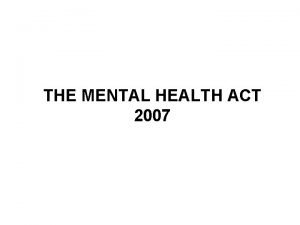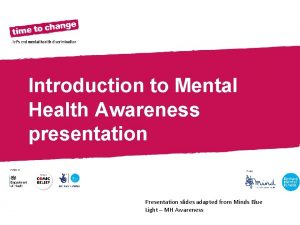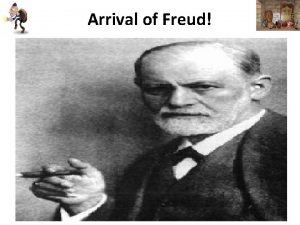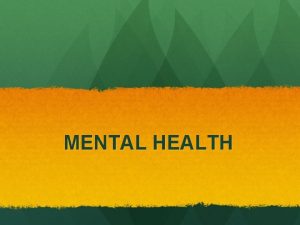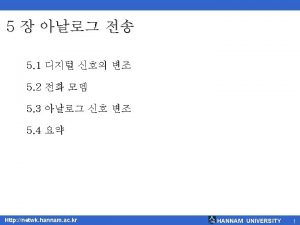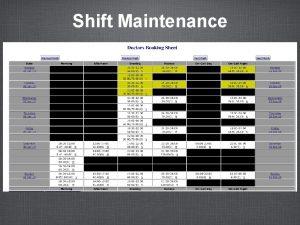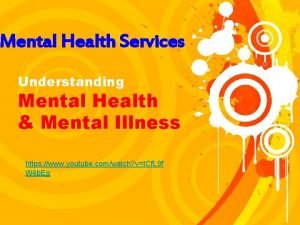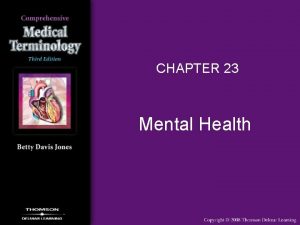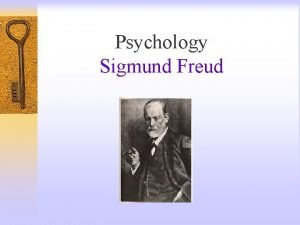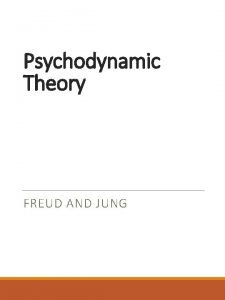History of Mental Health The Shift From Freud


















- Slides: 18

History of Mental Health The Shift From Freud and Analysis to Neurobiology and Drugs

1950 s-1970 s • 1940 s to 1970 s: Freud, sex and neurosis mild neurosis<------------>psychosis • One Flew Over the Cuckoo’s Nest • “Refrigerator Mothers” and autism • Thomas Szasz: psychiatrists are “thought police” • Psychoanalysis on the couch. . .

Sigmund Freud

One Flew Over the Cuckoo’s Nest

“Failure” of Psychiatry You know a few things about me, dear sweetheart Like my obsession with fantasy But what the rabble don't yet understand Is that fantasies become reality in my world. . . . John Hinckley Jr.

Hinckley’s Attempt on Reagan

1970 s • Psychiatry’s “crisis of legitimacy” • Insurance companies and federal government started putting limits on financial reimbursement for mental health treatment • New Demand: scientifically proven remedies • = R. D-B. C experiments of treatments

late 1970 s • “remedicalize” psychiatry: environment vs. biology • Effects of De-Institutionalization - 559, 000 institutionalized in 1955 - 138, 000 institutionalized in 1980 • New psychiatric “bible” – DSM III (1980): reliability, validity and focus on symptoms not causes

DSM III: Diagnostic and Statistical Manual of Mental Disorders • DSM I (1952) 106 diagnoses, 130 pages • DSM II (1968) 182 diagnoses, 134 pages • DSM III (1980) 265 diagnoses, 494 pages • Example of homosexuality in DSM II and DSM III

DSM III: Effects • Complete transformation of psychiatry and mental health treatment • Takeover of the profession by medical doctors away from psychotherapists • DSM III created diagnostic codes for insurance companies and federal government

DSM III: Aftermath • Freud and mind “out”; pills and brain “in” • Get off the sofa and into the pharmacy • The famous “Osheroff” case in the 1980 s

Prozac and Sub-Clinical Diagnosis

Beyond Prozac. . . • Debate over “cosmetic psychopharmacology” psychopharmacology e. g, dysthyma, ADHD, OCD, social anxiety disorder, PTSD Gregg Easterbrook article, “Psychology Discovers Happiness: I’m OK, You’re OK”

The Futile Pursuit of Happiness • Gilbert, Wilson, Loewenstein, & Kahneman: “We consistently misestimate the intensity and duration of something’s utility; this is known as the ‘impact bias’. ” Our ability to predict the emotional consequences of a decision, purchase, or event is less than we think. Rolling Stones: Instead of “you can’t always get what you want, ” it’s more like “you can’t always KNOW what you want. ” • Our mistakes of expectation can lead directly to mistakes in choosing what we think will give us pleasure. We often “miswant. ” • Key role of “adaptation” to good things and “resilience” to bad things. our “psychological immune system” (a sort of emotional “thermostat”) e. g. , Gladwell’s “Getting Over It” – controversial research on childhood sexual abuse e. g. , remember when you got your first dial-up 14, 400 baud modem?

Utility: The Futile Pursuit of Happiness • Utility estimation errors made in “hot” and “cold” states of rationality. e. g. , Rick James’ “Super Freak” dance experiment, unsafe sex, angry email • “Peak-End” phenomenon What we remember about the pleasurable quality of our past experiences is primarily determined by two things: (1) how an experience felt it was at its peak (best or worst), and (2) how it felt when it ended. e. g. , colonoscopy experiment to predict the follow-up rate

Happiness and the Tyranny of Choice “Choices” follow similar utility principles as chocolate bars and increases in wealth: the utility—the increase in happiness—from the first couple is large and infinitely better than no choices, but. . . Excessive Choice is often burdensome (psychologist Barry Schwartz). Why? (1) (2) (3) (4) (5) (6) Increases burden of information gathering to make a wise decision Doing all the “cost-benefit/expected utility” calculations is exhausting Increases expectations about how good the decision will be People often assemble an idealistic composite of all the options foregone Which increases the likelihood that they will regret the decision they make And increases the chance that they will blame themselves when a decision fails to live up to expectations. Schwartz: Perhaps colleges/universities offer too many choices now, which might help explain double-, triple-majoring, etc. (e. g. , Spiderbytes)

Happiness and the Tyranny of Choice • “Starter Marriages” phenomenon Census Bureau: 3 million divorced 18 -29 year-olds (1999) 253, 000 divorced 25 -29 year-olds (1962) • Atul Gawande, M. D. & cancer study - 65% of people surveyed say that if they were to get cancer, they would want to choose their own treatment; of those who do get cancer, though, only 12% actually want to choose • Steven Venti, Dartmouth economist & Employer 401 k plans The more funds employers offer their employees in 401 k plans, the less likely the employees are to invest in any of them. • Failure of “Voluntary Medicare Rx Drug Discount Cards” Too many choices and too complex for most senior citizens. • “Wine Warehouse” vs. “Gas Station” experiences • Depression and Happiness Surveys Growth in material affluence has not been matched by an equal growth in personal happiness. The number of Americans describing themselves as “very happy” declined by 5%, which means that 14 million fewer people report being “very happy” today than in 1975. Conversely, JAMA recently reported that the rate of serious clinical depression has more than tripled over the last two generations.

Combating the “Paralysis of Choice” Helpful countermeasures: (1) Group Decision-Making Political Scientist Paul Johnson’s research: - He asks his classes of roughly 25 students to predict who will win the Academy Award in several leading categories. - He has consistently found that the group predictions are better than the predictions of any one individual. In 1998, the group picked 11 of 12 winners, while the average individual in the group picked only 5 of 12 winners (and the single best individual picked only 9 winners). (2) Pro-Actively Limit Choices to “ 1 st order, ” “ 2 nd order, ” “ 3 rd order, ” etc. (3) Counterfactual Downward (4) Make Some Decisions Nonreversible (e. g. , Harvard photography class) (5) Anticipate Adaptation (6) Learn to Love Constraints (Say “No”)
 Chapter 20 mental health and mental illness
Chapter 20 mental health and mental illness Mental health jeopardy game
Mental health jeopardy game Types of electronic transition in uv-visible spectroscopy
Types of electronic transition in uv-visible spectroscopy Aniline uv spectrum
Aniline uv spectrum Difference between arithmetic shift and logical shift
Difference between arithmetic shift and logical shift Bathochromic shift and hypsochromic shift
Bathochromic shift and hypsochromic shift Difference between arithmetic shift and logical shift
Difference between arithmetic shift and logical shift Logical shift and arithmetic shift
Logical shift and arithmetic shift Gabriel hugh elkaim
Gabriel hugh elkaim Difference between arithmetic shift and logical shift
Difference between arithmetic shift and logical shift Posselt's diagram
Posselt's diagram Yparc frankston
Yparc frankston Lenawee county cmh
Lenawee county cmh Van buren county cmh
Van buren county cmh Intentional use of unfriendly or offensive behavior
Intentional use of unfriendly or offensive behavior Together for mental health
Together for mental health What is the mental health act 2007
What is the mental health act 2007 Wellbeing triangle
Wellbeing triangle Titles for mental health presentation
Titles for mental health presentation
